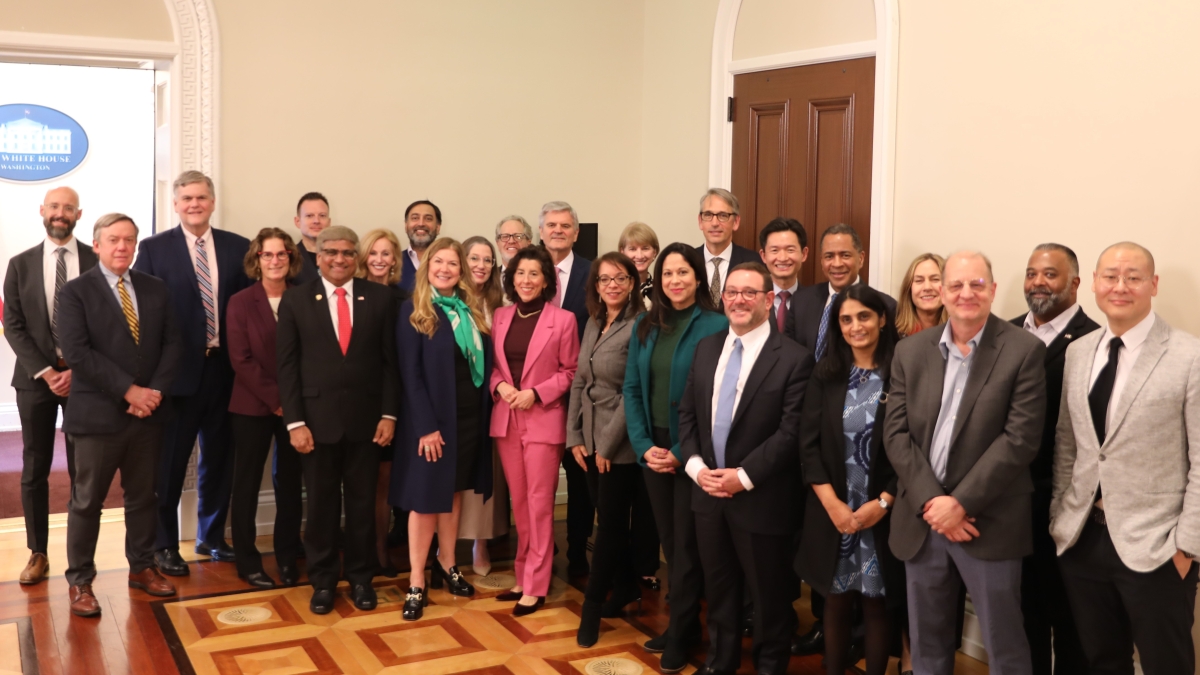ASU president, national council urge action to fuel US tech leadership

ASU President Michael Crow (second from left) and a national advisory council of leading entrepreneurs, innovators, investors, academics and economic development officials recently presented a 10-action plan to the White House on U.S. leadership in advanced technology. Photo by U.S. Department of Commerce
Arizona State University President Michael Crow and other members of a national advisory council on innovation and entrepreneurship presented their findings at the White House last week, calling for 10 actions to strengthen United States leadership in technology innovation.
The national council — which includes about 30 leading entrepreneurs, innovators, investors, academics and economic development officials — was tapped to develop recommendations to ensure America’s continued global leadership in developing, commercializing and scaling advanced technologies.
Crow and the council presented its full report to U.S. Commerce Secretary Gina Raimondo during a meeting at the White House. The timing is key, as the leaders urged action to accelerate the rate of innovation.
“This is about more than technology. This is about strengthening the country and our competitiveness, our economy and our security,’’ Crow said from Washington, D.C.
The council’s 10 recommendations for how the federal government and the private sector can help the United States lead in technology innovation focused on growing a skilled STEM workforce and removing barriers for entrepreneurs who usher innovative technologies into the market. The recommendations:
- Establish a National Innovation Council.
- Restore and expand national research and development investments in critical technologies.
- Launch a National Innovation Accelerator Network.
- Incentivize intellectual property commercialization for federally funded R&D.
- Provide cybersecurity and intellectual property resources to protect ideas and businesses.
- Expand growth capital access for entrepreneurs.
- Expand the diverse pool of venture capital investors across the U.S.
- Incentivize investing in R&D and startups run by women and minorities.
- Comprehensively support new, high-potential entrepreneurs.
- Break down barriers for new entrepreneurs to accelerate innovation.
The 10 recommendations would include investments in R&D, entrepreneurial ecosystems, talent pipelines and incentives for intellectual property commercialization. The report identifies opportunities for providing capital, tools and resources to entrepreneurs to enable faster U.S. innovation in technologies of the future.
The advisory council’s report and recommendations “provide a road map to help ensure America remains a global leader by expanding research and development, increasing access to capital, and fueling inclusive business growth across the country,” Raimondo said in a statement after the meeting.
More Science and technology

Stuck at the airport and we love it #not
Airports don’t bring out the best in people.Ten years ago, Ashwin Rajadesingan was traveling and had that thought. Today, he is an assistant professor at the University of Texas at Austin, but back…

ASU in position to accelerate collaboration between space, semiconductor industries
More than 200 academic, business and government leaders in the space industry converged in Tempe March 19–20 for the third annual Arizona Space Summit, a statewide effort designed to elevate…

A spectacular celestial event: Nova explosion in Northern Crown constellation expected within 18 months
Within the next year to 18 months, stargazers around the world will witness a dazzling celestial event as a “new” star appears in the constellation Corona Borealis, also known as the Northern Crown.…

